
Akinwande Oluwole Babatunde Soyinka, known as Wole Soyinka, is a Nigerian playwright, novelist, poet, and essayist in the English language. He was awarded the 1986 Nobel Prize in Literature, for "in a wide cultural perspective and with poetic overtones fashioning the drama of existence", the first sub-Saharan African to be honoured in that category. Soyinka was born into a Yoruba family in Abeokuta. In 1954, he attended Government College in Ibadan, and subsequently University College Ibadan and the University of Leeds in England. After studying in Nigeria and the UK, he worked with the Royal Court Theatre in London. He went on to write plays that were produced in both countries, in theatres and on radio. He took an active role in Nigeria's political history and its campaign for independence from British colonial rule. In 1965, he seized the Western Nigeria Broadcasting Service studio and broadcast a demand for the cancellation of the Western Nigeria Regional Elections. In 1967, during the Nigerian Civil War, he was arrested by the federal government of General Yakubu Gowon and put in solitary confinement for two years, for volunteering to be a non-government mediating actor.
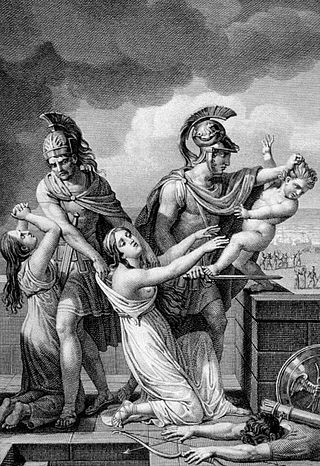
The Trojan Women, also translated as The Women of Troy, and also known by its transliterated Greek title Troades, is a tragedy by the Greek playwright Euripides. Produced in 415 BC during the Peloponnesian War, it is often considered a commentary on the capture of the Aegean island of Melos and the subsequent slaughter and subjugation of its populace by the Athenians earlier that year (see History of Milos). 415 BC was also the year of the scandalous desecration of the hermai and the launch of the Athenians' second expedition to Sicily, events which may also have influenced the author.

Nigerian literature may be roughly defined as the literary writing by citizens of the nation of Nigeria for Nigerian readers, addressing Nigerian issues. This encompasses writers in a number of languages, including not only English but Igbo, Urhobo, Yoruba, and in the northern part of the county Hausa and Nupe. More broadly, it includes British Nigerians, Nigerian Americans and other members of the African diaspora.

Chief Daniel Olorunfẹmi Fágúnwà MBE, popularly known as D. O. Fágúnwà, was a Nigerian author of Yorùbá heritage who pioneered the Yorùbá language novel.

The culture of Nigeria is shaped by Nigeria's multiple ethnic groups. The country has 527 languages, seven of which are extinct. Nigeria also has over 1150 dialects and ethnic groups. The three largest ethnic groups are the Hausas that are predominantly in the north, the Yorubas who predominate in the southwest, and the Igbos in the southeast. There are many other ethnic groups with sizeable populations across the different parts of the country. The Kanuri people are located in the northeast part of Nigeria, the Tiv people of north central and the Efik-Ibibio are in the south south. The Bini people are most frequent in the region between Yorubaland and Igboland.
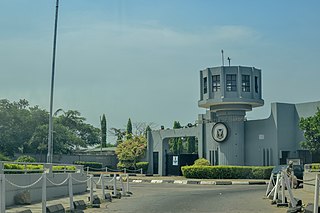
The University of Ibadan (UI) is a public research university in Ibadan, Nigeria. The university was founded in 1948 as University College Ibadan, one of many colleges within the University of London. It became an independent university in 1962 and is the oldest degree-awarding institution in Nigeria. Through its graduate network, the University of Ibadan has contributed to the political, industrial, economic and cultural development of Nigeria. The history and influence of the University of Ibadan have made it one of the most prestigious universities in Africa.
The Action Group (AG) was a Nigerian nationalist political party established in Ibadan on 21st March 1951, by Chief Obafemi Awolowo. The party was founded to serve as the platform for realizing his preliminary objective of mobilizing Western Nigerians to forestall the NCNC control of the Western Region and the subsequent aim of cooperating with other nationalist parties to win independence for Nigeria. It benefited immensely from the relationships developed in the Egbe Omo Oduduwa formed in Awolowo's days in London as a student.
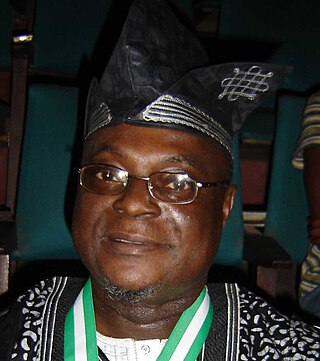
Babafemi Adeyemi Osofisan, known as Femi Osofisan or F.O., is a Nigerian writer noted for his critique of societal problems and his use of African traditional performances and surrealism in some of his plays. A frequent theme that his drama explore is the conflict between good and evil. He is a didactic writer whose works seek to correct his decadent society. He has written poetry under the pseudonym Okinba Launko.
Edith Hall, is a British scholar of classics, specialising in ancient Greek literature and cultural history, and professor in the Department of Classics and Centre for Hellenic Studies at King's College, London. She is a Fellow of the British Academy. From 2006 until 2011 she held a Chair at Royal Holloway, University of London, where she founded and directed the Centre for the Reception of Greece and Rome until November 2011. She resigned over a dispute regarding funding for classics after leading a public campaign, which was successful, to prevent cuts to or the closure of the Royal Holloway Classics department. She also co-founded and is Consultant Director of the Archive of Performances of Greek and Roman Drama at Oxford University, Chair of the Gilbert Murray Trust, and Judge on the Stephen Spender Prize for poetry translation. Her prizewinning doctoral thesis was awarded at Oxford. In 2012 she was awarded a Humboldt Research Prize to study ancient Greek theatre in the Black Sea, and in 2014 she was elected to the Academy of Europe. She lives in Cambridgeshire.
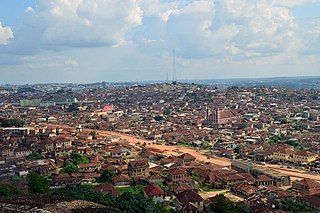
Abeokuta is the capital city of Ogun State in southwest Nigeria. It is situated on the east bank of the Ogun River, near a group of rocky outcrops in a wooded savanna; 77 kilometres (48 mi) north of Lagos by railway, or 130 kilometres (81 mi) by water. As of 2006, Abeokuta and the surrounding area had a population of 449,088.
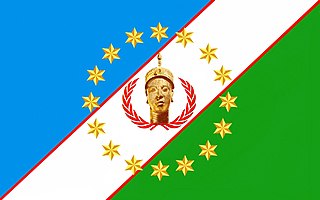
The Yoruba people are a West African ethnic group that mainly inhabit parts of Nigeria, Benin, and Togo. The areas of these countries primarily inhabited by the Yoruba are often collectively referred to as Yorubaland. The Yoruba constitute more than 50 million people in Africa, are over a million outside the continent, and bear further representation among members of the African diaspora. The vast majority of the Yoruba population is today within the country of Nigeria, where they make up 21% of the country's population according to CIA estimations, making them one of the largest ethnic groups in Africa. Most Yoruba people speak the Yoruba language, which is the Niger-Congo language with the largest number of native or L1 speakers.
The Owu sub-ethnicity is a part of the Yoruba people of West Africa. Ago-Owu in Abeokuta is where the Owus are mostly concentrated, however large Owu settlements are found throughout Yorubaland. The Yoruba confederacy of kingdoms extends beyond the boundaries of Nigeria into the Republic of Benin and Togo.

Women of Owu is a 2006 book written by Femi Osofisan and published through University Press PLC. Adapted from Euripides' The Trojan Women, the book uses the combination of choruses, songs and dance to depict the history of the people of Owu kingdom after a combined military force of Ife, Oyo and Ijebu invaded the city of Owu for seven years killing all of its male inhabitants and children.
Barbara Elizabeth Goff is a Classics Professor at the University of Reading. She specialises in Greek tragedy and its reception; women in antiquity; postcolonial classics and reception of Greek political thought.
Adenike Osofisan, is a Nigerian professor of Computer science, who specializes in data mining and knowledge management. She is the first Nigerian woman to hold a Ph.D. in Computer science, a feat she accomplished in 1989. In 2006, she became a full professor at University of Ibadan, a promotion that made her the first African woman to become a Computer Science professor.

Shelley P. Haley is the Edward North Chair of Classics and Professor of Africana Studies at Hamilton College, New York, and President of the Society for Classical Studies. She is an expert in applying Black feminist and critical race approaches to the study and teaching of Classics.
Ruby Blondell is Professor of Classics, Adjunct Professor of Gender, Women, & Sexuality Studies, and Byron W. and Alice L. Lockwood Professor of Humanities at the University of Washington. Their research and teaching centres on Greek intellectual history, gender studies, and the reception of ancient myth in contemporary culture.

Folake Oritsegbubemi Onayemi is Professor of Classics and Head of the Department of Classics at the University of Ibadan in Nigeria. She was the first woman to be awarded a PhD in Classics in Nigeria and the first black woman to be Professor of Classics in sub-Saharan Africa. She is an expert on comparative Greco-Roman and Nigerian literature, cultures, and mythology, particularly relating to the roles and representations of women.
Odo Ere, popularly called Ere Gajo, is the headquarters of Yagba West Local Government Area, Kogi State, Nigeria. The town is located in the old Kabba Province about 140 kilometres southeast of Ilorin. The people of Odo Ere share a common ancestry with the Yoruba people in South-West Nigeria and they are often referred to as Okun Yoruba people. The town is situated on a well-watered savannah plain consisting of dotted hills, forest and grassland. The topography earned the town the sobriquet: Ere Ọmọ Onilẹ Dun Rin, meaning "Odo Ere town with a beautiful flat terrain that enhances ease of movement".
Ebun Clark is an academic and the first Nigerian professor in the field of theatre arts.












